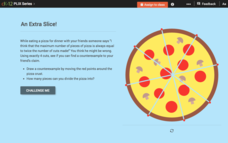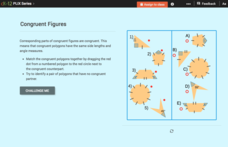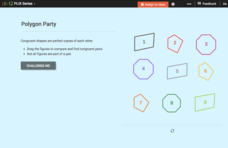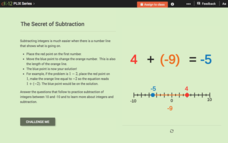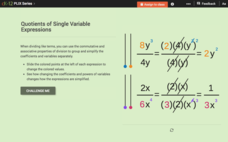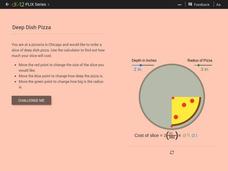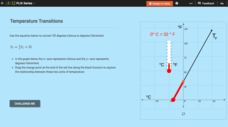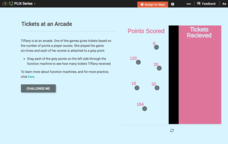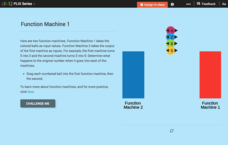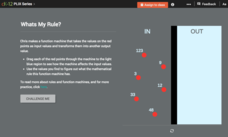CK-12 Foundation
Visual Patterns: Balloons
Balloons aren't just for little kids; they can teach important math concepts, too. Individuals use an interactive to continue a color pattern with balloons. They continue the pattern and write a mathematical expression to represent the...
CK-12 Foundation
Number Patterns: Square Sizes
Size up an interactive on square sizes. Scholars adjust the side length of a square to represent the next term in a geometric pattern. They answer a set of challenge questions on the pattern to complete the activity.
CK-12 Foundation
Converse, Inverse, and Contrapositive
Logically speaking, here is a great resource. Young mathematicians apply an interactive to consider the converse, inverse and contrapositive statements. Eight challenge questions assess understanding of the material.
CK-12 Foundation
Conjectures and Counterexamples: An Extra Slice!
Class members will eat up an enticing interactive that lets users change the location of cuts made into a pizza to adjust the number of created slices. They create a counterexample for a conjecture on the number of slices.
CK-12 Foundation
Properties of Equality and Congruence: Justifying Algebraic Steps
No need to justify using this resource. Learners drag justifications for each step of solving an equation in an interactive. To see if they are correct, all they need to do is use a slider and the correct answers appear.
CK-12 Foundation
Properties of Congruence: Congruent Figures
No two resources are exactly the same, but polygons can be. Scholars match congruent figures by dragging them together in an interactive. They answer some challenge questions that justify their matches.
CK-12 Foundation
Intersecting and Parallel Lines
Sometimes line segments just refuse to meet. Young mathematicians connect houses on an interactive map using line segments. They must then determine whether these line segment pairs are intersecting or parallel.
CK-12 Foundation
Properties of Congruence: Polygon Party
Don't let congruent figures drag you down. Young mathematicians use an interactive to drag figures onto one another to determine if the figures are congruent.
CK-12 Foundation
Rational Numbers in Applications: Pizza with Friends
Explore the application of fractions in a real-life situation. Learners manipulate an interactive simulation to model a given scenario. They find fractions of fractions and explain the importance of the part-to-whole comparison.
CK-12 Foundation
Distributive Property: Catching Fireflies
Model the distributive property with jars of fireflies! An interactive animation has learners manipulate the number of jars of fireflies to determine the number caught. Accompanying questions ask scholars to consider the multiplication...
CK-12 Foundation
When to Use the Distributive Property: Rational Expressions
Discover how the distributive property applies to division. As learners change numeric values within an expression, the simulation calculates its value. Challenge questions lead individuals to realize the power of distributing the...
CK-12 Foundation
Properties of Real Number Addition: The Secret of Subtraction
Learners sometimes struggle to understand the concept of adding and subtracting integers. Help them see the why behind their answers using the interactive number line. The values change as individuals adjust the number line for each new...
CK-12 Foundation
Simplify Variable Expressions Involving Integer Addition
Ensure your classes aren't drowning in expressions. An interactive simulation has scholars change the depth of a fish based on the coefficient of terms. As they add the terms together, the fish bobs up and down until reaching the answer.
CK-12 Foundation
Simplify Sums or Differences of Single Variable Expressions: Addition and Subtraction of Like Terms
Investigate the process of combining like terms using an interactive animation. Scholars tackle simplifying expressions by manipulating rectangles that represent the terms. They add and subtract terms to arrive at the result.
CK-12 Foundation
Simplify Products or Quotients of Single Variable Expressions: Circling C's
Model expression division using online manipulatives. Learners drag C's representing a term into equal groups. Guiding questions help them see their groups as the division of the term.
CK-12 Foundation
Simplify Products or Quotients of Single Variable Expressions: Quotients of Single Variable Expressions
Investigate division within an algebraic term using an inquiry-based lesson. Individuals adjust sliders and watch as the simplification of the term changes. Questions help guide them to important conclusions.
CK-12 Foundation
Linear Equations: Deep Dish Pizza
Explore the volume of solids with a real-life connection. Learners calculate the volume of a deep-dish slice of pizza to determine its price. They model the slice as a part of a cylinder and create a formula for calculating the cost.
CK-12 Foundation
Linear Equations: Temperature Transitions
Explore linear conversions using an engaging interactive lesson. Learners drag a point on a graph to discover the equivalent degrees in Fahrenheit and Celsius. Embedded questions highlight key features such as slope and the y-intercept.
CK-12 Foundation
Function Rules for Input-Output Tables: Soda Sugar Function Table
Examine the relationship between the input and output variables in a table of values. As learners build an input-output table using online manipulatives, they begin to identify patterns. They answer questions about these patterns and...
CK-12 Foundation
Function Rules for Input-Output Tables: Function Machine 2
Model function operations using a function machine. An interactive lesson has learners determine the patterns of a double function machine. They use the patterns to write functions and make connections between the inputs and outputs.
CK-12 Foundation
Function Rules for Input-Output Tables: Tickets at an Arcade
This is the ticket to learning about function rules! Using online manipulatives, scholars build a table of values and then answer questions about the related function. They examine the relationship between the input and output values and...
CK-12 Foundation
Function Rules for Input-Output Tables: Function Machine 1
Challenge your classes to find the pattern of a double function machine. After recording the outputs of both machines, learners identify the pattern and the corresponding function. Both patterns involve adding/subtracting a constant.
CK-12 Foundation
Function Rules for Input-Output Tables: Whats My Rule?
What's the rule that makes it true? A virtual function machine generates output values as learners submit the input values. Their job is to analyze the inputs and outputs for a pattern and write a function rule.
CK-12 Foundation
Function Rules for Input-Output Tables: Function Machine!
Watch as a function machine converts an input to an output. Learners determine the work applied by the function machine to write a function rule. Questions accompany the function machine animation to guide individuals to conclusions.
Other popular searches
- New Years Resolutions
- New Year Resolutions
- Debate Resolutions
- New Year's Resolutions
- Poetry New Year Resolutions
- United Nations Resolutions
- Resolutions for New Year
- Positive Resolutions
- Writing Resolutions
- Conflict Resolutions
- Making New Years Resolutions
- New Year Resolutions Poems





